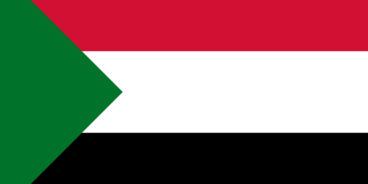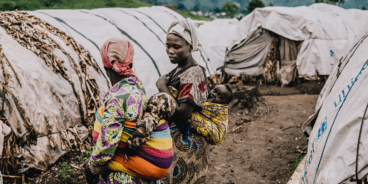
Open Letter to the UN Security Council Concerning the Situation in DRC, November 2008
In 2005, world leaders agreed that the international community has a responsibility to protect populations from genocide, war crimes, ethnic cleansing, and crimes against humanity. The current perilous situation in eastern Democratic Republic of Congo (DRC) – with its long-suffering civilian population again at serious risk from mass atrocity crimes – demands that the Security Council takes urgent action to deliver on that responsibility.
The resumption of fighting two months ago between Laurent Nkunda and his rebel group and the Congolese armed forces has led to the displacement of a million people in North Kivu, an estimated 200,000 of whom were displaced in the last few weeks, some of them used as a human shield by Nkunda in his advance on the regional capital, Goma. Human rights groups report that Congolese government troops have engaged in rape, looting and stealing vehicles, as they flee from Nkunda’s forces. Humanitarian organizations, who have been forced to cease operations, say that Goma’s 600,000 residents are at risk from attack and lack of access to food and medical care.
Human rights violations currently committed by the parties in conflict in North Kivu have clearly crossed the thresholds laid out by the responsibility to protect norm adopted by the General Assembly at the 2005 World Summit. The violations include: forced displacement that is not for clear military objectives or to protect civilians; rape as a weapon of war; and the killing of civilians including on the basis of ethnicity.
Yet the situation could get even worse if the fragile ceasefire reached by the parties breaks down. The risk of Nkunda resuming the offensive and occupying Goma, now defended only by a small contingent of UN troops, and of the Congolese government mobilizing Rwandan Hutu rebels to regain lost ground, presents the real possibility that the campaign of violence could threaten the lives of hundreds of thousands more. It could lead to ethnic violence against Tutsis in South Kivu and north Katanga, and a campaign of revenge killings by Nkunda’s forces. Escalation of the conflict may also draw neighboring Rwanda into the conflict once again, reignite the regional war, and lead to a major humanitarian catastrophe among a population that already lacks essential food, adequate shelter and medical care.
The responsibility to protect norm reaffirms the commitment of a state to protect its populations from genocide, war crimes, ethnic cleansing, and crimes against humanity and includes the imperative that states should assist the host state in protecting the population from these atrocities. The norm also recognizes, however, that in cases where a state “manifestly fails” to protect its populations, the international community must be prepared to act in a timely and decisive action. The failure of the Congolese government to effectively protect its population has made this one of the most desperate situations on earth. It is past time that the responsibility to protect norm be applied meaningfully in DRC.
The Security Council must now deliver on the UN’s commitment to act in a timely and decisive manner to save people and avert the risk of mass atrocity crimes.
It is essential that the Council use the full range of applicable measures at its disposal. The current crisis stems from the Security Council’s past political failures to tackle genocide in Rwanda and the ensuing conflicts in the eastern DRC and wider Great Lakes region. This includes a failure to ensure the implementation of the November 2007 Nairobi declaration between the governments of DRC and Rwanda, and the January 2008 Goma agreement between the parties to the conflicts in North Kivu. A step change in political engagement is required from the Security Council to press Nkunda and the Congolese to sustain the ceasefire, and to insist to the Rwandan and Congolese governments that they uphold existing obligations and commitments to stop supporting Nkunda’s insurgency and Rwandan Hutu rebels, respectively.
The Special Representative of the Secretary-General in Congo has called for reinforcements for the UN mission which is struggling to fulfill its mandate to support the Congolese government to protect its citizens. There is widespread consensus on the urgent need for increased international military presence in Goma, to provide better protection for the civilian population, to deter the parties from breaking the ceasefire, and to provide space for the essential political dialogue. The Security Council must take swift decision on this point.
A UN Special Envoy should also be sent to the region immediately to provide the required leadership and coordination of international efforts to reverse the current escalation and coordinate the implementation of the Nairobi declaration and Goma agreements. It is essential that there be effective disarmament and disbanding of all armed groups and militias in north Kivu, both foreign and national, and the restoration of sustainable civilian state authority in North Kivu. It is crucial that such an envoy receive the support of Security Council members’ Heads of State.
The Security Council must also apply other measures at its disposal to avert these crimes. It must enforce compliance with the sanctions regime it has put in place, involving an arms embargo and targeted sanctions, including against those that recruit child soldiers or use rape as a weapon of war. And it must recognize the centrality of tackling the impunity of those responsible for Rwanda’s genocide, as well as war crimes and crimes against humanity in DRC – including widespread sexual violence and recruitment of child soldiers – which has made the region so vulnerable to further mass atrocity crimes. The Council should express support for ongoing trials by the International Criminal Court of militia leaders in the DRC, and encourage the Office of the Prosecutor to renew and reinvigorate investigations that may lead to new indictments of figures involved in the current violence.
The 2005 agreement on the responsibility to protect was meant to mean never again to atrocity crimes. Eastern DRC is a test of international resolve to save lives — now.
Signed:
Jan Egeland, Director, Norwegian Institute of International Affairs, former UN Under-Secretary-General for Humanitarian Affairs, and member of the International Advisory Board, Global Centre for the Responsibility to Protect
Thelma Ekiyor, Member of the International Advisory Board, Global Centre for the Responsibility to Protect
Gareth Evans, President of the International Crisis Group, former Australian Foreign Minister, and Co-Chair of the International Advisory Board, Global Centre for the Responsibility to Protect
Rama Mani, Councillor of the World Future Council, Member of the International Advisory Board, Global Centre for the Responsibility to Protect
Juan Méndez, President, International Center for Transitional Justice, former UN Secretary-General’s Special Adviser on the Prevention of Genocide, and member of the International Advisory Board, Global Centre for the Responsibility to Protect
Mohamed Sahnoun, President, Initiatives of Change-International, former Special Adviser to the UN Secretary-General, and Co-Chair, International Advisory Board, Global Centre for the Responsibility to Protect
Monica Serrano, Executive Director, Global Centre for the Responsibility to Protect
Thomas G. Weiss, Director of the Ralph Bunche Institute for International Studies , and member of the International Advisory Board, Global Centre for the Responsibility to Protect
Related Content


